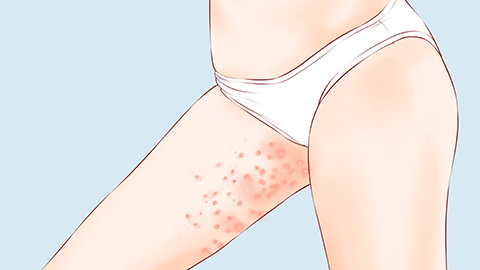What causes urticaria?
Under normal circumstances, the main causes of urticaria include food allergies, environmental irritants, allergic rhinitis, bacterial infections, and systemic lupus erythematosus. If symptoms such as rashes or itching occur, it is recommended to seek timely medical evaluation and treatment at a reputable hospital. Specific analyses are as follows:
1. Food Allergies
Consuming allergenic foods such as seafood, mangoes, and nuts can trigger abnormal immune responses, leading to the release of histamine and other substances that cause skin blood vessel dilation, hives, and itching. It is important to immediately stop consuming the offending food and keep a food diary to avoid future exposure. For significant itching, antihistamines such as cetirizine hydrochloride tablets, loratadine capsules, or ebastine tablets may be taken under medical guidance to inhibit histamine activity and relieve symptoms.

2. Environmental Irritants
Exposure to pollen, dust mites, or animal dander, as well as fluctuations in temperature or excessive ultraviolet radiation, can activate immune cells in the skin and induce urticaria. Daily preventive measures include maintaining a clean environment, regular dust mite control, avoiding pollen exposure, using sun protection when outdoors, and dressing appropriately to stay warm.
3. Allergic Rhinitis
Inflammation caused by nasal exposure to allergens can lead to the spread of inflammatory factors throughout the body, potentially triggering skin immune reactions and urticaria. Under medical supervision, intranasal corticosteroids such as budesonide nasal spray or mometasone furoate nasal spray can be used to control rhinitis symptoms. Additionally, oral medications like montelukast sodium tablets, levocetirizine hydrochloride tablets, or chlorpheniramine maleate tablets may help reduce systemic allergic responses and prevent recurrence of urticaria.
4. Bacterial Infection
Bacterial infections can disrupt immune system balance and indirectly trigger urticaria. Antibiotics such as amoxicillin capsules or cefuroxime axetil tablets may be prescribed under medical supervision. Concurrent use of cyproheptadine hydrochloride tablets, loratadine syrup, or other antihistamines can help alleviate urticaria symptoms.
5. Systemic Lupus Erythematosus (SLE)
In SLE, autoantibodies attack normal tissues, impairing immune function and potentially causing chronic urticaria. Treatment under medical guidance may include hydroxychloroquine tablets and methylprednisolone tablets. Concomitant use of epinastine capsules, olopatadine hydrochloride tablets, or compound glycyrrhizin tablets can help modulate the immune response and relieve urticaria symptoms.
In daily life, it is important to identify and record allergens and avoid contact with them; maintain skin cleanliness and avoid scratching to prevent skin damage and infection; follow a regular sleep schedule to strengthen immunity; and adhere strictly to prescribed medication regimens without adjusting dosages independently, in order to maintain healthy skin.






